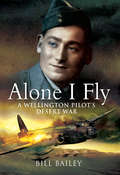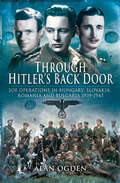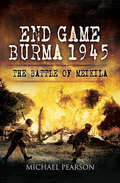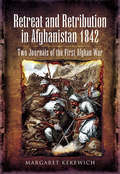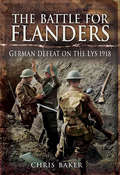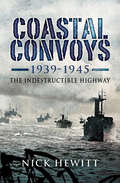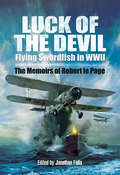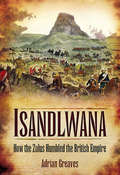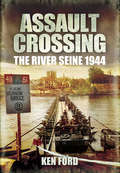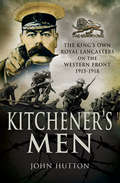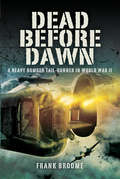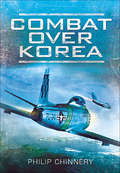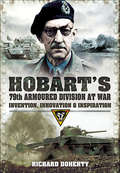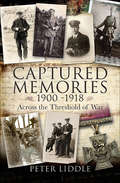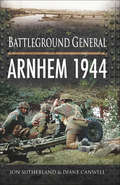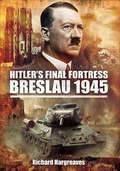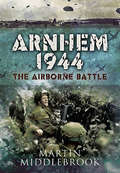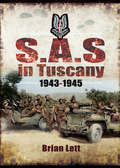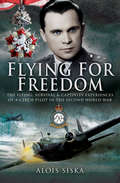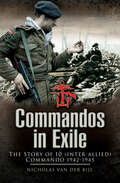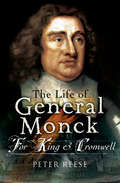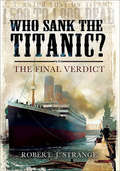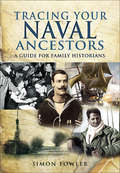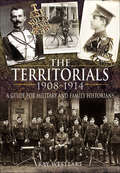- Table View
- List View
Alone I Fly: A Wellington Pilot's Desert War
by Bill BaileyThe riveting firsthand account of an RAF pilot&’s adventures in World War II—from life-and-death situations to unusual posts that test his usual good humor. After several years at sea, Sgt Bill Bailey arrived in Cairo in 1942 as a new recruit to the RAF, hoping to fulfill his ambition to fly bombers. Within hours of his arrival he is sent on his first bombing mission as second pilot in a 104 Squadron Wellington. Hit by enemy gunfire, his aircraft suffered continual loss of altitude until hitting a rock outcrop and disintegrating. Bailey came to lying alone on a precipitous ledge and soon realized that he was the sole survivor. To stay alive in temperatures of over 100 degrees, he trudged over seemingly endless dunes at dusk and dawn, his energy gradually fading. Though he ultimately found shelter in an abandoned German reconnaissance truck, he gradually resigned himself to death. But with a last desperate inspiration Bailey realized that it might be possible to attract attention by heliograph. He found enough equipment in the truck and rigged a mast with the mirror at the top and commenced signaling, eventually being rescued by a Long Range Desert Patrol. After recuperation, Bailey rejoined his squadron and was given a new crew with whom he completed his tour. He was then sent to Malta where much to his amazement he was made ground controller of a satellite fighter airfield. This is Bailey&’s uniquely harrowing and humorous account of situations beyond his control—both in and out of the cockpit—during the Second World War.
Alone I Fly: A Wellington Pilot's Desert War
by Bill BaileyThe riveting firsthand account of an RAF pilot&’s adventures in World War II—from life-and-death situations to unusual posts that test his usual good humor. After several years at sea, Sgt Bill Bailey arrived in Cairo in 1942 as a new recruit to the RAF, hoping to fulfill his ambition to fly bombers. Within hours of his arrival he is sent on his first bombing mission as second pilot in a 104 Squadron Wellington. Hit by enemy gunfire, his aircraft suffered continual loss of altitude until hitting a rock outcrop and disintegrating. Bailey came to lying alone on a precipitous ledge and soon realized that he was the sole survivor. To stay alive in temperatures of over 100 degrees, he trudged over seemingly endless dunes at dusk and dawn, his energy gradually fading. Though he ultimately found shelter in an abandoned German reconnaissance truck, he gradually resigned himself to death. But with a last desperate inspiration Bailey realized that it might be possible to attract attention by heliograph. He found enough equipment in the truck and rigged a mast with the mirror at the top and commenced signaling, eventually being rescued by a Long Range Desert Patrol. After recuperation, Bailey rejoined his squadron and was given a new crew with whom he completed his tour. He was then sent to Malta where much to his amazement he was made ground controller of a satellite fighter airfield. This is Bailey&’s uniquely harrowing and humorous account of situations beyond his control—both in and out of the cockpit—during the Second World War.
Through Hitler's Back Door: SOE Operations in Hungary, Slovakia, Romania and Bulgaria 1939–1945
by Alan OgdenRomania, Bulgaria, Hungary and Slovakia were all German allies in the Second World War, unlike the other countries of Europe which had either been forcibly occupied by the Nazis or remained neutral. SOE Missions mounted within their borders were thus doubly hazardous for they were conducted in enemy-populated territory, heavily policed by military forces and gendarmerie. Furthermore all these states had well developed and experienced security services, usually supplemented by Gestapo and Abwehr units. A further complication to the activities of SOE in these countries was that they had all been effectively conceded by Western Allies to Russia; not surprisingly therefore, operations in the Soviet sphere of influence were to prove diabolically difficult.This is a story about the courage of individuals in the face of overwhelming odds. Hunger, ill-health, exhaustion, cold and treachery all combined to make life for those members of SOE who parachuted into these Fascist outposts of Fortress Europe as insufferable as it was dangerous. For weeks on end, the SOE missions moved continually at night, chased by enemy troops, betrayed by local villagers, awaiting air drops that never came and listening out for orders that were rarely specific. Thus the picture that emerges of SOE activities in these countries is one of heroic proportions, with courage, dedication and daring displayed by every mission.Although nearly all SOE personnel were either killed or captured, the impact of their clandestine operations served as a persistent irritant, continuously undermining Germanys strategic and political assumptions about the loyalty of her allies.
End Game Burma, 1945: Slim’s Masterstroke at Meikila
by Michael PearsonWhen the Burma campaign is discussed, the turning point battles of Imphal and Kohima are most often thought of. However General Bill Slims bold but risky plan to outflank the Japanese on the Irrawaddy at Mandalay deserves far more credit.With the Japanese withdrawing, Slims 14 Army (with two Corps XXXIII and IV) risked a punishing crossing of the mighty Irrawaddy at Mandalay opposed by the main Japanese army. To avoid this is was decided to split 14 Army and send IV Corps on an arduous 300 mile march to seize the town of Meiktila, 85 miles south, a vital rail and road hub and the main Japanese administrative base.Complete secrecy was essential as if the Japanese realized they faced only one Corps rather than two, they might have counter attacked successfully. In this detailed analysis of this crucial maneuver the author describes the plan, the risks, the actions, the seemingly insuperable logistic problems, and the efforts to retain US air support (for which Mountbatten was largely responsible).
Retreat and Retribution in Afghanistan 1842: Two Journals of the First Afghan War
by Margaret KekewichThe blow to British pride and confidence caused by the crushing defeat of their army in Afghanistan during the winter of 1841/2 compares in its impact to the disaster in New York on 11 September 2001. The British had replaced a popular and effective monarch with a weak one in the mistaken belief that he would keep the Russians at bay. Two years later, nearly all the British and Indian soldiers in the region were killed in a popular uprising.Margaret Kekewichs perceptive new study of the conflict describes the British defeat, their reoccupation of Afghanistan in the spring of 1842, then their final withdrawal at the end of the year. Her account, which is based on the graphic diaries written by two British eyewitnesses, gives a fascinating insight into the conflict in Afghanistan 150 years ago.The story is told by, first, Lady Sale who together with over 100 women, children and soldiers was captured and imprisoned by the Afghans. The second account comes from the Reverend Allen, a young chaplain to the army that invaded Afghanistan in April 1842 to avenge British humiliation and rescue the prisoners. Both these eyewitnesses deplored the follies that had led to war and defeat and also the suffering that was inflicted on many innocent Afghans.At a time when British forces are deeply engaged in another war in Afghanistan, Margaret Kekewich offers a balanced and thought-provoking new perspective on a previous conflict in the region.
The Battle for Flanders: German Defeat on the Lys 1918
by Chris BakerThe Battle of the Lys, fought in April 1918, was critical for the Allies and for Germany. The outcome of the Great War hung in the balance. After the successful German offensive on the Somme, their breakthrough on the Lys threatened Ypres and the British hold on Flanders and brought them close to victory on the Western Front. The Allied line was broken it was only saved by improvisation and great gallantry—and the German onslaught tested Allied cooperation under the newly appointed Generalissimo Ferdinand Foch to the limit. Yet, as Chris Baker shows in this compelling account, the declining force of the German attack revealed deficiencies in material, organization and morale that led to their ultimate defeat.
Coastal Convoys 1939–1945: The Indestructible Highway
by Nick HewittUsing official records from the National Archives personal accounts from the Imperial War Museum and other sources, Coastal Convoys 1939 1945: The Indestructible Highway describes Britains dependence on coastal shipping and the introduction of the convoy system in coastal waters at the outset of the war. It beings to life the hazards of the German mining offensive of 1939, the desperate battles fought in coastal waters during 1940 and 1941, and the long struggle against German air and naval forces which lasted to the end of the Second World War. Reference is also made to the important role played by coasters during the Dunkirk evacuation in 1940 and the Normandy landings in 1944.
Luck of the Devil: Flying Swordfish in WWII
by Robert le PageRobert le Page flew with the Fleet Air Arm from 1940 to 1945, mostly in 816 Squadron flying carrier-based Fairey Swordfish. He saw action mine-laying off Cherbourg, hunting U-boats, escorting convoys in the North Atlantic and Arctic seas and covering D-Day. Much of his early war years were aboard HMS Dasher and he was lucky to be ashore when the carrier mysteriously exploded and sank in the Clyde. This decimated 816 Squadron which was eventually re-equipped and then worked up to operational readiness to fly from HMS Tracker. His story is full of insights into wartime naval flying. For example when they were tasked with finding and attacking German E Boats they found that in a headwind these powerful boats could outdistance the Stringbag. They devised a plan which was to glide as quietly as possible on their approach to the quarry and power up the engine only seconds before they attacked a plan that was unfortunately unsuccessful. Once when landing in rough weather his aircraft was waved to go round again. With throttle wide open the Swordfish struggled back into the air, but alas the tailhook snagged the top wire of the barrier protecting other parked aircraft. The author remembered staring down from the stalling aircraft to see a terror stricken fitter gazing up at him. Fortunately all survived.
Isandlwana: How the Zulus Humbled the British Empire
by Adrian GreavesThe historian and founder of the Anglo-Zulu War Historical Society presents his groundbreaking account of the Battle of Isandlwana. The story of the British Army&’s defeat at Iswandlwana in 1879 has been much written about, but never with the detail and insight revealed by the research of Dr. Adrian Greaves. In reconstructing the dramatic and fateful events, Greaves draws on newly discovered letters, diaries and papers of survivors and other contemporaries. These include the contemporary writings of central figures such as Henry Harford, Lt Henry Carling of the Royal Artillery, August Hammar and young British nurse Janet Wells. These historical documents, coupled with Greaves&’s own detailed knowledge of Zululand, enable him to paint the most accurate picture yet of this cataclysmic battle that so shamed the British establishment. We learn for the first time of the complex Zulu decoy, the attempt to blame Colonel Durnford for the defeat. Greaves uncovers evidence of another &“Fugitives&’ Trail&” escape route taken by battle survivors, as well as the identity of previously unknown escorts for Lieutenants Coghill and Melville, both awarded Victoria Crosses for trying to save the Colors.
Assault Crossing: The River Seine 1944
by Ken FordThe assault crossing of the River Seine by the British 43rd (Wessex) Division in August 1944 remains one of the most important operations of the closing stages of the Second World War. Once the obstacle of the great river had been overcome, General Horrocks unleashed the armor of XXX Corps on their historic dash across northern France and Belgium.Assault Crossing Ken Fords classic account of this critical battle—is the story of one British division pitted against one German division. On one side, a fully equipped, battle-hardened unit made up of soldiers from the ancient Kingdom of Wessex, backed by some of the best artillery in the world and supported by tanks. On the other side, a much-depleted, second-rate, static division of men of various nationalities conscripted to fight a war for Germany that was already lost. On paper the British were assured of success, but between the two opposing armies lay the Seine 680 feet of open water, overlooked by high chalk cliffs riddle with defensive strong points. The Germans were waiting.In hindsight, the battle was described as an epic operation and used as an example to train future generations of soldiers. In reality, as with most battles, it was something of a shambles, lurching from crisis to crisis until the eventual bridgehead was secured.In his graphic narrative Ken Ford gives a fascinating insight into the planning of the operation and the confusion of the battlefield, and he records, using eyewitness testimony, what the battle was really like for the soldiers who were there.
Kitchener's Men: The King's Own Royal Lancasters on the Western Front, 1915–1918
by John HuttonIn Kitchener's Men John Hutton provides a absorbing account of the raising, training and fighting experiences of the Service and Territorial battalions of the Kings Own Royal Lancasters in France during the Great War. His book gives a graphic insight into the daily routine and grim reality of warfare on the Western Front for men who were mostly recruited from the Furness area of the northwest. They came from the steel mills, shipyards and engineering workshops of this heavily industrialized part of Britain. They responded to the call to defend their country and its values at a critical moment in the nations history, and the endured incredible hardship, suffering and violence as a result. All together, these battalions of the King's Own took part in every major campaign on the Western Front from the spring of 1915 until the end of the war. They had a remarkable record, and John Hutton's meticulously researched history allows the reader to follow them through every phase of the fighting. His account makes compelling reading.
Dead Before Dawn: A Heavy Bomber Tail-gunner in World War II
by Frank BroomeFrank Broome was a 15 year old schoolboy when he experienced the three major blitzes in his home city of Coventry and at the age of 17 volunteered for the Royal Air Force Volunteer Reserve in 1942 for pilot training. This autobiography, based on his copious diary entries and log books traces his pilot training in the UK, Canada and the USA where he flew single and twin-engined aircraft. Despite his almost perfect training record he, like many of his fellow trainees at this time, was not to gain his R.A.F. wings. There was a shortage of air crew, other than pilots, and Frank eventually transferred to an air-gunnery course. On his return to the UK he undertook operational crew training on Wellington as a tail gunner and made operational training sorties over enemy territory shortly after the D-Day landings. His crew then converted to four-engined heavy bombers first the Halifax and then the Lancaster. He gives first-hand detailed accounts of the many missions during his tour with No. 626 Squadron during the height of Bomber Commands massed raids over Germany and occupied Europe. Excitement abounds with narrow squeaks from enemy night-fighters, radar directed anti-aircraft fire and other hazards of this most dangerous task. He eventually flew with two Wing Commanders and a Squadron Leader with crews who gained several gallantry awards. His book is written with a skill that portrays the dangers inherent in his task, the humor of service life and the sound reasons why his generation were proud to fly with Bomber Command.
Combat Over Korea
by Philip ChinneryCombat Over Korea offers a superb selection of thrilling accounts by Allied airmen of their experiences. These include air combat between fighters, a B29 Superfortress bomber ditching in the sea, C-54 cargo plane being attacked by North Korean fighters. We read of the exploits of the 21 Troop Carrier Squadron (The Kyushu Gipsies) who flew into impossibly short strips to rescue thousands of wounded soldiers they received the Presidential Citation for their feat. Others tell of their hair-raising escapades after being shot down. While a number miraculously avoided capture (often due to the skill of fellow pilots), many were less lucky. Their treatment in captivity was often brutal. Very few escaped but 1st Lieutenant Melvin Shadduck did and he tells his story here, as do others who have remarkable experiences to describe. While it was not until 1955 that the last POWs were released, the Author concludes that there is every possibility that a number were denied freedom forever.
Hobart's 79th Armoured Division at War: Invention, Innovation & Inspiration
by Richard DohertyThis WWII history chronicles the remarkable career of a brilliant British Army commander and the innovative armored vehicles he created. Joining the Royal Tank Corps in 1923, Major-General Percy Hobart quickly established himself as one of the foremost thinkers on armored warfare. By 1938 he was GOC Mobile Division, later 7th Armored Division, in Egypt. He was also known for not suffering fools—a tendency that got him briefly relieved of his command. But during World War II, Winston Churchill called Hobart back to Army service with orders to train the now-legendary 11th Armored Division. He was then tasked with designing specialist armored fighting vehicles capable of breeching the Atlantic Wall. Known as Hobart's Funnies, these unique vehicles included mine-clearing tanks, bridge-carrying tanks, flamethrowers, swimming tanks and amphibious assault vehicles. Operated by Hobart&’s 79th Armored Division, they played a major part in the D-Day landings and the subsequent European campaigns. Hobart's skills played a significant part in the final Allied victory, and the specialized funnies he introduced to modern warfare have since been adopted by all armies all over the world. Drawing on official records and personal recollections, historian Richard Doherty tells the incredible story of Percy Hobart and his 79th Armored Division.
Captured Memories, 1900–1918: Across the Threshold of War
by Peter LiddlePeter Liddle was a pioneer in the recording of memories of personal experience in the First World War and in the social background of those who lived through those years. Later he moved into the recording of men and women for whom the Second World War was the formative experience of their lives. In a planned two volume collection of the most outstanding interviews of the four thousand he made, for the first volume he has chosen memories which take the reader back as many as a hundred and twenty years to days in sailing ships, a Hebridean boyhood, suffragist action, pre–1914 working class life and work in the North-East of England, city life in London, service in the Boer War, pioneering a settlement in Manitoba, Canada, and the Army's experiments in the use of man-lifting kites, airplanes and balloons.The main focus of the book is upon the First World War with The Western Front battles, the Gallipoli Campaign and the Battle of Jutland prominently featured. Liddle also represents the Mesopotamian and East African fronts and women nursing under particularly unusual circumstances. Several Victoria Cross award winners and a fighter pilot ace appear, as do those whose distinction was to come later in their lives like Harold Macmillan, Henry Moore, Gordon Jacob, Emanuel Shinwell, Barnes Wallis and Victor Silvester. There is even an interview with the first conscientious objector to be court-martialed and sentenced to death before commutation of the sentence. This book is a veritable treasure trove of the past.
Arnhem 1944: Arnhem 1944 (Battleground General Ser.)
by Diane Canwell Jon SutherlandThis is the first in a series of game books which put you in command of the forces in engaged in some of history's most famous battles. Your tactical skill and ability to make the right command decision will be tested at every turn of the page. Operation Market Garden in September 1944 was one of the most daring Allied plans of the Second World War. An audacious surprise assault from the air, it was intended to give the Allies a bridgehead across the Rhine, removing the last significant natural barrier on the road to Berlin. If successful it might have shortened the war by months. Will the brave British paratroopers be able to seize the vital bridge at Arnhem and hold it until reinforcements fight their way through? Or will the Germans be able to recover the initiative and crush them in a skillful counterattack? The book presents you with a series of command decisions, aided by situation maps; directing you to the next relevant briefing depending on the option you choose. No dice are necessary to play, just this book and your tactical skill. When you buy this book, the fate of nations is in your hands.
Hitler's Final Fortress: Breslau 1945 (Stackpole Military History Ser.)
by Richard HargreavesA dramatic account of how the Nazis were driven out of Breslau, drawing on the words of those who witnessed it. In January 1945, the Red Army unleashed its long-awaited thrust into Germany with terrible fury. One by one the provinces and great cities of the German East were captured by the Soviet troops. Breslau, capital of Silesia, a city of 600,000 people, stood firm and was declared a fortress by Hitler. A bitter struggle raged as the Red Army encircled Breslau, then tried to pummel it into submission while the city&’s Nazi leadership used brutal methods to keep the scratch German troops fighting and maintain order. Aided by supplies flown in nightly and their building improvised weapons from torpedoes mounted on trolleys to an armored train, the men of Fortress Breslau held out against superior Soviet forces for three months. The price was fearful. By the time Breslau surrendered on May 6, 1945, four days after Berlin had fallen, tens of thousands of soldiers and civilians were dead, the city a wasteland. Breslau was pillaged, its women raped and every German inhabitant driven out of the city which became Wroclaw in postwar Poland. Based on official documents, newspapers, letters, diaries, and personal testimonies, this is the bitter story of Hitler&’s final fortress.
Arnhem 1944: The Airborne Battle
by Martin MiddlebrookA detailed history of the World War II battle, featuring experiences from over 500 participants, by the author of The First Day on the Somme. The Battle of Arnhem was a turning point in the war, a gamble by Montgomery, using three airborne divisions to capture a series of bridges spanning the wide rivers of Holland and unleash the Allied armies into the plains of northern Germany. If the bridges had been captured and held, and the ground forces had been able to relieve the airborne forces, then there would have been a good chance of ending the war before Christmas, 1944. It all went wrong. Although the bridges taken by the Americans were relieved by ground troops, these troops could not reach Arnhem quickly enough. In the meantime, only a small part of the 1st British Airborne Division had reached the Arnhem Bridge. Most of the remainder of the airborne force was held up on the outskirts of the town by German units that turned out to be far stronger than expected—a major intelligence failure. After nine days of fighting, the survivors of the division were withdrawn across the Rhine, and it was not until many months later that ground forces captured Arnhem. Using the technique he has perfected over twenty-five years of military study, blending meticulous research based on original documents with the personal experiences of more than 500 participants, Martin Middlebrook describes the Battle of Arnhem from start to finish, from one end of that complicated battlefield to the other. He offers a masterly summary of what went wrong in the last major defeat in battle suffered by the British Army.
S.A.S. in Tuscany, 1943–1945
by Brian LettWhile always dangerous and daring, SAS operations are by no means invariably successful and when they go wrong, they do so very badly. The first of the three operations covered in this book, SPEEDWELL 2, saw six men drop blind into Northern Tuscany on 8 September 1943, by chance the day of the Italian Armistice. But with no radios or air/ground support their courageous three week operation ended in disaster; four were captured and executed and only one got out. The second and third operations, GALIA (winter 44/45) and BLIMEY (April 1945), provided contrasting results. GALIA, 34 men led by Captain Walker-brown, tied up many thousands of enemy troops for nearly two months under extreme winter conditions an extraordinary achievement, thanks in measure to cooperation with an SOE mission led by Major Gordon Lett, the authors father. BLIMEY sadly achieved little and the reasons for the success and failure of these two operations are carefully analyzed.This book adds valuable new information on SAS operations in WWII.
Flying for Freedom: The Flying, Survival and Captivity Experiences of a Czech Pilot in the Second World War
by Alois SiskaAlois Siska was born in Czechoslovakia and learnt to fly. He escaped to the UK after the German invasion and joined the R.A.F. He describes his experiences flying Wellington bombers. In December 1943 he was shot down and he and surviving members of the crew were adrift in the North Sea for 7 days in appalling conditions. Picked up by the Germans he underwent surgery to his badly wounded legs and became a POW. He suffered at the hands of the Gestapo and was held in numerous camps including Colditz. His injuries were so extensive that he was put under the care of Archibald McIndoe. Siska chose to return to his native country to join their air force but fell foul of the Communist authorities. His persecution is described in the closing chapters. His rank was restored only in 1991 on the collapse of the Communist regime. Despite his injuries he remained active until 2003 when he died just short of his 90th birthday. He was as an active member of the Czech Ex-R.A.F. Association, the R.A.F. Benevolent Fund in his country, and the Sue Ryder Homes for which he raised considerable funds. His death was marked with a fly-past of the Czech Air Force and he was posthumously awarded the highest military decoration—The Order of the White Lion.
Commandos in Exile: The Story of 10 (Inter-Allied) Commando, 1942–1945
by Nicholas van der BijlFormed from members of Free Forces who had escaped from German occupation, 10 (Inter-Allied) Commando was one of the most unusual units in WW2. All members had to pass the Green Beret commando course at Achnacarry in Scotland and the book begins by describing this training. With no less than six national troops, plus X Troop drawn from exiled Jews, 10 Commando never fought as an entity but loaned troops for specific operations, such as One Troop (French) taking part in the Dieppe Raid, 2 Troop (Dutch) fighting at Arnhem, 5 Troop (Norwegian) raiding the Lofoten Islands etc. At other times groups played a key intelligence role questioning POWs, translating captured documents, conducting reconnaissance patrols and intelligence gathering on the D-Day beaches. The history of X Commando, made up of escaped Jewish individuals is especially interesting.The book also reviews the growth of post-war national Commando forces.
Life of General George Monck: For King and Cromwell
by Peter ReeseGeneral George Monck is famous for the key role he played in the restoration of the monarchy in 1660. His actions changed the course of British history, but his statesmanship in the dangerous time between the death of Cromwell and the bloodless return of Charles II distracts attention from his extraordinary career as a soldier and general, admiral, governor and administrator. During the confused, often bloody era of the English Civil Wars and the Protectorate he was one of the great survivors. Peter Reese, in this perceptive new study, follows Monck through his long, varied career, from his impoverished upbringing in the West Country and his military apprenticeship on the Continent, to his experience as a commander on both sides during the civil wars. He distinguished himself on the battlefields of Ireland and Scotland, and as a general-at-sea for both Cromwell and Charles II. His shrewdness and firmness of character, his skill as a leader, his high popularity with his troops and his occasional ruthlessness gained for him a formidable reputation. On Cromwell's death he was one of the few men in England with the power, personal authority and political skill to secure the restoration of Charles II and to bring to an end twenty years of conflict.
Who Sank the Titanic?: The Final Verdict
by Robert J. Strange"Designed as the technological marvel of her age, RMS Titanic claimed to be the largest, strongest, safest ship of the early 20th Century; a triumph of centuries of Great Britains unrivaled shipbuilding expertise. Yet nothing could be further from the truth. The 1500 American and British victims of RMS Titanic went to their watery graves never knowing that much of the ship was imperfectly forged from cheap and recycled scrap-iron and that the tragedy was caused by a chain of gross negligence and greed.Crime investigator Robert Strange has studied scientific, forensic evidence from metal raised from the ships carcass miles deep on the ocean floor, and secrets hidden for a hundred years within the archives of the shipyard that built and launched the Titanic, to answer the question: Who Sank the Titanic?Who Sank the Titanic: The Final Verdict examines the intense cost-cutting pressures which contributed to Titanics demise and one of the greatest loss-of-life disasters in maritime history. The book uncovers gross negligence in every area of the ships planning and construction and accuses her owners, her planners, her builders and the Government ministers who watched her set sail of complicity in one of the greatest mass-homicides in history. Robert Strange is a highly experienced producer and director of TV programs both in the UK and US. He has produced series for the BBC, ITV, Channel Four and satellite channels including Panorama, Dispatches, Cutting Edge and True Stories. A one-time Fleet Street investigative reporter and crime correspondent, he has been fascinated by the Titanic disaster and this book is the result of five years of extensive research."
Tracing Your Naval Ancestors: A Guide for Family Historians (Tracing Your Ancestors)
by Simon FowlerThis concise guide to naval history and naval records is essential reading and reference for anyone researching the fascinating story of Britains navy and the men and women who served in it. Whether you are interested in the career of an individual seaman, finding out about a medal winner or just want to know more about a particular ship, campaign or operation, this book will point you in the right direction. Simon Fowler assumes the reader has little prior knowledge of the navy and its history. His book shows you how to trace an officer, petty officer or rating from the seventeenth century up to the 1960s using records at the National Archives and elsewhere. The book also covers the specialist and auxiliary services associated with the navy among them the Royal Marines, the Fleet Air Arm, the naval dockyards, the WRNS and the Fleet Auxiliary. In each section he explains which records survive, where they can be found and how they can be used for research. He also recommends resources available online as well as books and memoirs. His handbook is a valuable research tool for anyone who is keen to find out about the career of an ancestor who served in the Royal Navy or was connected with it.
The Territorials, 1908–1914: A Guide for Military and Family Historians
by Ray WestlakeThe Territorials 1908–1914 is a unique, comprehensive record of the part-time soldiers who made up the Territorial Force that supported the regular army in the years immediately before the outbreak of the First World War. Previously information on the history and organization of these dedicated amateur soldiers has been incomplete and scattered across many sources but now, in this invaluable work of reference, Ray Westlake provides an accessible introduction to the Territorial Force and a directory of the units raised in each county and each town. The origin, aims and organization of the Territorial Force are described as well as the terms of service, recruitment, equipment and training. But the bulk of the book consists of details of over 600 Territorial units plus a comprehensive account of every city, town or village associated with them. Essential information on the all the infantry formations is supplied, but also covered are the yeomanry, the artillery, the engineers, the Royal Army Medical Corps and the Army Service Corps. Ray Westlakes historical guide of the Territorial Force the forerunner of the present-day Territorial Army - will be of enduring value to military and family historians.
